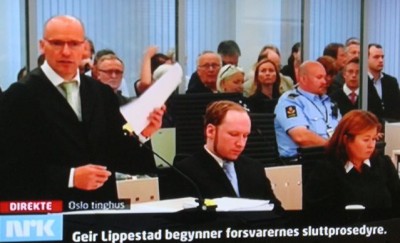Defense counsel for confessed terror defendant Anders Behring Breivik asked an Oslo court on Friday to either acquit Breivik, on the grounds his attacks of July 22 were “necessary” to his anti-Islamic campaign, or sentence him on the grounds he is sane and thus accountable for his actions. It was, admitted defense attorney Geir Lippestad, “a special situation.”

Special indeed, since most defense attorneys seek an insanity ruling so their clients can avoid prison. In this case, it’s the prosecution who won’t rule out the possibility that Breivik was insane when he killed 77 persons last summer, and thus asked the court on Thursday to commit him to psychiatric care. Lippestad spent nearly three hours arguing the opposite, on the final day of his client’s 10-week trial.
He asked for the shortest prison term possible for his client, even though he had agreed at the outset with the prosecution that Breivik’s attacks were “so gruesome” that the very thought of “small, safe Norway” being subject to such violence was almost impossible to understand. That itself can have caused, according to Lippestad, the most thorny problem facing Breivik’s trial: Conflicting court-ordered psychiatric reports on the state of Breivik’s mental health. The first report, based on examinations of Breivik shortly after his attacks when the country remained in a state of emergency, concluded Breivik was insane and explained his attacks as the acts of a mentally ill man suffering from paranoid schizophrenia.
Not so, argued Lippestad, pointing to the examinations of a long list of other psychiatrists who examined Breivik, including a second court-appointed pair, who found no signs of psychosis. Lippestad picked apart the first pair’s report, disputing their belief that he’d withdrawn into his own world and lost his ability to function. On the contrary, argued Lippestad, pointing to Breivik’s ability to carefully plan his attacks and carry them out. He also noted how Breivik had no history of prior violence and, during the period when the first team believes Breivik lost functionality and started suffering from delusions, how Breivik was politically active, joined the Free Masons, practiced at a shooting range, bought and sold stock and had at least some social contact with family and old friends. Even the massive amount of time he spent playing computer games demanded concentration, contact with others and adhering to time schedules, Lippestad claimed.
Terrorism, not illness, behind the attacks
Lippestad described Breivik as a political terrorist, not a sick person driven by violence. The first pair of psychiatrists, who left the prosecution with enough doubt about Breivik’s mental health that they opted for psychiatric treatment over prison for him, did not look at Breivik’s actions in “the right-wing context” that Lippestad and Breivik himself thinks is critical to the case.
Even though Lippestad conceded that July 22 amounted to “an inferno of violence,” the attacks were carefully targeted in line with Breivik’s political goals. The prosecution argued on Thursday that Breivik’s goal was “to kill as many people as possible.” Lippestad refuted that: “He could have gone to Oslo City (a large, crowded shopping center) or Karl Johans Gate (the city’s main parade boulevard), there were many more people there than at the government complex on a Friday afternoon in July,” Lippestad told the court. Instead, his targets were politically motivated: Norway’s Labour Party-led government and the party’s youth organization, which Breivik believed was producing the next generation of Labour politicians whom he blamed for allowing the immigration, especially of Muslims, that he so strongly opposes.
“It’s extremism that lies behind his attacks,” said Lippestad, not sickness. It’s “unscrupulous terrorism” that’s behind the violence, he added, not psychosis. Lippestad outlined how Breivik earlier had participated in public debate on immigration and Islam, how the right-wing blogger known as “Fjordman” was Breivik’s “main mentor,” how Breivik’s mother and former friends said he would become “intense” when discussing politics. The attacks on July 22 were, Lippestad said, Breivik’s “fireworks” to draw attention to his political project. He also pointed to Breivik’s choice of victims while carrying out his massacre at the Labour summer camp on Utøya, claiming Breivik spared young children and those he thought were like himself.
Court ‘free to choose’ between psychiatric reports
Now it’s up to the five-member judicial panel to decide whether they’ll sentence Breivik to psychiatric care, in line with the prosecution’s wishes, or either free him or send him to jail, in line with the defense counsel’s requests. Lippestad stressed on several occasions during his closing arguments that the court need not feel bound by the doubt over Breivik’s mental health that influenced the prosecution. The court “stands free” to rule in favour of which court-appointed psychiatrists’ report they believe is most correct. Lippestad offered a new twist to a statement made Thursday by prosecutor Svein Holden, who justified their doubt and call for psychiatric treatment by saying it would be “worse for a psychotic person to be sentenced to jail, than for a non-psychotic person to be committed to psychiatric care.”
Lippestad instead cited a doctor at Norway’s main state psychiatric hospital, who told him “it’s just as bad to treat someone who’s healthy as it is to not treat someone who is sick.”
It was confirmed later on Friday that the court will announce its verdict on August 24.
Views and News from Norway/Nina Berglund
Please support our news service. Readers in Norway can use our donor account. Our international readers can click on our “Donate” button:

